Rev Canon Yvonne Tulloch, CEO of charity AtaLoss, has been on a mission to address the UK’s ignorance over death, after her husband died suddenly. Here she explains why we need to train churches in bereavement support.

Easter is here, and like Lent, it has themes of suffering and death, which are rather unattractive. Add to that our British culture’s general aversity to death, it’s no wonder the Easter period isn’t celebrated as much as Christmas.
For almost a century our British culture has been ‘death denying’. Since the two world wars and due to increased medical advances, we have pushed death away, confining it to hospitals, hospices and funeral directors – almost kidding ourselves that it will only affect us when we’re 90. However, death is a universal experience, as certain as life itself, and sooner or later we will face our death or that of someone else.
Since 2016 I’ve been on a mission to address our country’s ignorance over death.
Since 2016 I’ve been on a mission to address our country’s ignorance over death. My husband died suddenly, when I was an ordained minister, and I realised then how little we know about grief and how to support those who are bereaved. I had been trained to take funerals, but even I didn’t understand how difficult bereavement can be, or the challenges that bereaved people face.
My life went into freefall as I succumbed to the many physical, mental, psychological, emotional and spiritual responses to grief. I was trying to cope with an environment that doesn’t understand these as natural and necessary for our wellbeing, and which generally serves to make matters worse. I descended into sorrow; I was confused, I couldn’t function, and God disappeared.
My life went into freefall as I succumbed to the many physical, mental, psychological, emotional and spiritual responses to grief.
Everything seemed hopeless and my experience seemed alien to the Christianity I knew, and the way people spoke and behaved in Church. However, my situation was turned around by being directed to support – groups of Christians who had experienced bereavement and who gave me hope by validating my grief and coming alongside.
As a result, through a charity I formed - AtaLoss - I’ve since been providing signposting in bereavement and training churches in bereavement support. In particular, we’ve recently been offering The Bereavement Journey course, a programme of films and peer group discussion for bereaved people to process and support each other through their loss. Over 300 courses are already running, and they are transforming people’s lives and giving them hope.
Wonderfully, the tide is turning. The pandemic forced us to confront our mortality, and grief is no longer taboo. In fact, grief is rapidly becoming a hot topic. The Queen’s death revealed a nation of loss, and since then our charity has been in the media 2-3 times a week talking about grief, widespread unprocessed loss, the need and opportunity for churches. Research has shown that despite church funerals being in decline the public want help with their grief - and churches running The Bereavement Journey are reporting 80%+ attendance from outside church, with over 90% choosing to come to the optional session on faith.
Read more on dying
Should Christians be afraid of dying?
‘I had made peace with dying, but the thought of being crippled was harder’
Dame Esther Rantzen wants to die well - can joining Dignitas really deliver?
Jesus is a ‘Man of Sorrows, acquainted with grief’. On the cross he found himself in darkness and felt abandoned by God. Furthermore, his call to us as Christians is to take up our cross to follow him.
This Easter can we therefore dare to address grief? Jesus’ suffering and death on Good Friday, along with the disciples’ sorrow and desolation of Easter Saturday, are as much a part of the Easter story as Easter Day itself. Suffering and death are at the core of our gospel message and can’t be ignored.































No comments yet